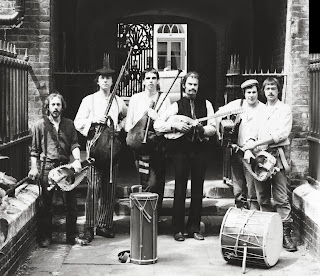Named after a seventeenth century English dance tune, Blowzabella played a mix of English, French and Balkan tunes with characteristic gusto and relish on instruments like the hurdy-gurdy and the bagpipes, instruments that in England at least had been largely forgotten. Though never fully embraced by the English folk establishment their influence has been immense.
For instance, they took a major role in reviving those instruments in the UK. Founder member Jon Swayne went on to become an internationally acclaimed pipe-maker, known especially for his English Border pipes (or English Half-Longs).
Many of the band's compositions became session standards, played in Britain, Germany, Holland, France and America: tunes like The Man in a Brown Hat, the Motorway Mazurka, the Rose of Raby and so on.
Their popularity abroad is such that when in 2003 they played a three-hour, headline set at Saint Chartier in France, the crowd was so large the organisers had to pull up the dance floor to make room. By the end of the gig there was so much dust in the air you could barely see the band.
But most importantly, I think, they helped reignite interest not only in traditional dance-music but also in drone-music more generally. In 1987 Jon Swayne wrote presciently that:
'a reassessment is taking place, whether conscious or unconscious, of the values symbolised by the forces of Dionysus/Bacchus representing irrationality, chaos, the power of the inner feminine; these are rising against the values of Apollo, the upward-striving play of reason and intellect, masculine control, the cool music of the spheres, which have help sway for two thousand years.'
That reassessment is still underway.
The extraordinary thing is that after thirty-five years on the margins of British folk, in which they've suffered the usual trials and tribulations of any long-lived and independent band, they're still going strong, still playing to sell-out audiences, still knocking out the killer tunes.
I certainly owe them a lot for I wouldn't be a musician or a piper without them. Much of my repertoire comes from their albums. My pipes were made by Jon and, indeed, I studied technique with him for a couple of years when I lived in Bristol. It was therefore a great honour and privilege to be asked to play a tune with them in Exeter on their recent tour. Thanks guys.
I've said it before and I'll say it again, surely now it's time for their lifetime achievement award?














Thanks for your kind and supportive words Andy. I think we've benefited greatly over the years from having the confidence to go our own way and not feel pressured to try and fit in with any sort of wider "scene". We're just one of a growing number of truly independent bands who make their own luck - we do everything ourselves - and happily operate below the radar of the media and outside of any particular music scene. It has very many advantages. For example, we've noticed that it makes no difference to what we do if we send out review copies of our albums to the press or not. You can send out 300 CDs and get maybe 10 reviews back of which the majority are so badly written as to be misleading for audiences. We're not at all afraid of criticism, we are wary of the damage caused by people who analyse music without the benefit of much knowledge, skill or experience, however well meaning. That sounds harsh but is a conclusion arrived at through actual experience over many years.
ReplyDeleteThe internet works so well for niche arts / music interests that we've successfully by-passed all the traditional gatekeepers of the music business, in all its guises, by communicating directly with our audience.
More than that though, the independent/co-operative ethos (which we learned from the early days.. from the community arts/free festival/punk movements of the 70s) has forced us to develop strategies to survive - to make our own luck - by working hard on our music. If we take our foot off the gas, nothing at all happens for us, and when we set ourselves a few simple goals, and don't get distracted from pursuing them, we achieve much more - and in a more satisfying way. All the more so because it's such a direct relationship with our audience who help us more than they know.
So, Lifetime Achievement Award? We already have a lot of contact with our audience and we get all the appreciation we need.
Thanks again for your views and support.
Paul James www.blowzabella.co.uk
What fantastic music, thanks Andy for introducing me to Blowzabella! I just wanted to up and dance around the family room!
ReplyDeleteI first came across Blowzabella swanning around in 16th century costume on stilts at Hood Fayre, Totnes (or was it Ashburton?) at the close of the 1970s.
ReplyDeleteIt was a defining moment for me, not least because they nudged me in the direction of Saint-Chartier, where I was able to plug into a network of luthiers, ethnomusicologists, movers, shakers, loonies, epicures, bibulous gluttons and other people after my own heart.